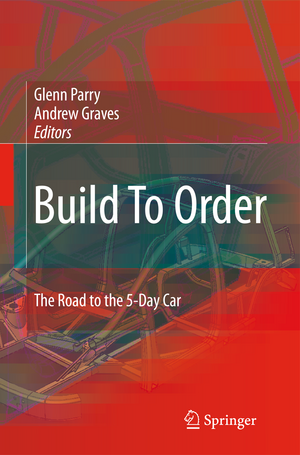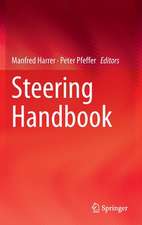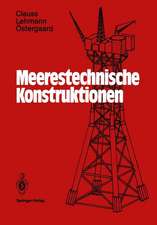Build To Order: The Road to the 5-Day Car
Editat de Glenn Parry, Andrew Peter Gravesen Limba Engleză Hardback – 24 sep 2008
| Toate formatele și edițiile | Preț | Express |
|---|---|---|
| Paperback (1) | 648.42 lei 6-8 săpt. | |
| SPRINGER LONDON – 13 oct 2010 | 648.42 lei 6-8 săpt. | |
| Hardback (1) | 658.88 lei 6-8 săpt. | |
| SPRINGER LONDON – 24 sep 2008 | 658.88 lei 6-8 săpt. |
Preț: 658.88 lei
Preț vechi: 775.14 lei
-15% Nou
Puncte Express: 988
Preț estimativ în valută:
126.07€ • 131.99$ • 104.32£
126.07€ • 131.99$ • 104.32£
Carte tipărită la comandă
Livrare economică 05-19 aprilie
Preluare comenzi: 021 569.72.76
Specificații
ISBN-13: 9781848002241
ISBN-10: 1848002246
Pagini: 438
Ilustrații: XX, 438 p.
Dimensiuni: 155 x 235 x 30 mm
Greutate: 0.93 kg
Ediția:2008
Editura: SPRINGER LONDON
Colecția Springer
Locul publicării:London, United Kingdom
ISBN-10: 1848002246
Pagini: 438
Ilustrații: XX, 438 p.
Dimensiuni: 155 x 235 x 30 mm
Greutate: 0.93 kg
Ediția:2008
Editura: SPRINGER LONDON
Colecția Springer
Locul publicării:London, United Kingdom
Public țintă
Professional/practitionerCuprins
and Overview.- and Overview.- Industry Dynamics.- The Evolution of Competition in the Automotive Industry.- Build-to-Order: Impacts, Trends and Open Issues.- Current Issues at OEMs and Suppliers.- Outsourcing: Management and Practice Within the Automotive Industry.- Modularity.- An Overview of Modular Car Architecture: the OEMS Perspective on Why and How.- The Modular Body.- Modular Concepts and the Design of the ModCar Body Shell.- Complexity Cost Management.- Collaboration.- Key Principles of Flexible Production and Logistics Networks.- Collaborative Planning Processes.- Collaborative Execution Processes.- Functionalities of Supporting IT Systems: Current Situation, Future Requirements and Innovative Approaches.- Modelled Scenario Examples for Planning and Execution Processes.- Validation.- A BTO Reference Model for High-Level Supply Chain Design.- Rapid Supply Chain Design by Integrating Modelling Methods.- Moving Towards BTO – An Engine Case Study.- How the Electro-Mechanical Valve Train Accelerates Logistics and Reduces Costs.- Network Design for Build-to-Order Automotive Production.- Implementation.- Automotive e-hubs: Exploring Motivations and Barriers to Collaboration and Interaction.- Automotive Supplier Park Strategies Supporting Build-to-Order.- Managing the Transition to the “5-Day Car” in Europe.- The Road Ahead.- The Road to the 5-Day Car.
Recenzii
From the review:
This book is interesting and well organised... [T]he editors have been able to well integrate the different contributions proposing a book which appears homogeneous... and well written.
Production Planning & Control Vol. 20, No. 8 (December 2009) (Reviewer: Paulo Gaiardelli)
This book is interesting and well organised... [T]he editors have been able to well integrate the different contributions proposing a book which appears homogeneous... and well written.
Production Planning & Control Vol. 20, No. 8 (December 2009) (Reviewer: Paulo Gaiardelli)
Notă biografică
Glenn Parry is a senior research fellow in the University of Bath's School of Management (UK), having joined the university after working for the UK Lean Aerospace Initiative, WMG and the University of Warwick (UK). He is participating in the EU Intelligent Logistics for Innovative Product Technologies (ILIPT) project, which explores the feasibility of producing and delivering a bespoke car within only 5 days. His research interests include enterprise transformation and the move to service; application of lean and agile thinking, and development of practice, within automotive, aerospace and construction contexts; and enterprise resource planning systems.
Andrew Graves is Professorial Fellow, Management of Technology, also at the University of Bath (UK). He has worked as development engineer and team manager in the world of Formula 1 and 2 racing, and from 1985 he was part of the Science Policy Research Unit at the University of Sussex (UK). He is a member of several professional bodies, including the Aerospace, Innovation & Growth Team, DTI; the Automotive Innovation & Growth Team, DTI; and the SMMT Motorists Working Group.
Andrew Graves is Professorial Fellow, Management of Technology, also at the University of Bath (UK). He has worked as development engineer and team manager in the world of Formula 1 and 2 racing, and from 1985 he was part of the Science Policy Research Unit at the University of Sussex (UK). He is a member of several professional bodies, including the Aerospace, Innovation & Growth Team, DTI; the Automotive Innovation & Growth Team, DTI; and the SMMT Motorists Working Group.
Textul de pe ultima copertă
Visit any modern car production line and you will be faced by a showcase of modern technology and advanced logistics combining in a clinical environment to produce rows of automobiles, each significantly different from the one before and after it. From stamping out the sheet steel body to driving a finished car off the line typically takes under 30 hours. However, if you try and buy a car to your specification you can expect to wait around 55 days, despite production lines frequently running below capacity. Why can’t you have your car in 30 hours plus delivery time?
The challenge of mass customisation, building cars to customer order, brings great value to both the customer and the automotive industry. Building cars to customer order eliminates the need for companies to hold billions of dollars worth of finished stock. Any company able to free this capital would improve their competitive position and be able to reinvest in future product development. The benefits to all are clear and the first to market an operational build-to-order system will generate a significant cost advantage that may be difficult to emulate. The question for many automotive executives is not when but how exactly will such a radically ‘different’ business model operate.
Build To Order: The Road to the 5-Day Car addresses the conceptual and practical aspects for achieving the automotive industry’s next goal: the rapid delivery to the customer of a bespoke vehicle only days after placing an order.
The challenge of mass customisation, building cars to customer order, brings great value to both the customer and the automotive industry. Building cars to customer order eliminates the need for companies to hold billions of dollars worth of finished stock. Any company able to free this capital would improve their competitive position and be able to reinvest in future product development. The benefits to all are clear and the first to market an operational build-to-order system will generate a significant cost advantage that may be difficult to emulate. The question for many automotive executives is not when but how exactly will such a radically ‘different’ business model operate.
Build To Order: The Road to the 5-Day Car addresses the conceptual and practical aspects for achieving the automotive industry’s next goal: the rapid delivery to the customer of a bespoke vehicle only days after placing an order.
Caracteristici
Addresses the conceptual and practical aspects for achieving the rapid delivery to the customer of a bespoke vehicle only days after placing an order Includes supplementary material: sn.pub/extras
















